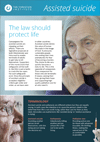Patients seeking assisted suicide are often concerned about losing control rather than pain, a leading end-of-life care specialist says.
Dr David Jeffrey says the real question is whether the small group “who have an exaggerated need for control” should be able to demand the help of medics to commit suicide.
Writing in the BBC’s Scrubbing Up online column, Dr Jeffrey says: “It is also commonly assumed that patients who carry out PAS (physician-assisted suicide) must be suffering terrible pain.
“However, the patients who use PAS in Oregon are generally not in pain, but wish to use PAS simply so that they can control the timing of their death.”
He explains why the UK should not follow the lead of Oregon in the US, where PAS is legal.
He is concerned that in Oregon in 2007 none of the patients provided with ‘suicide drugs’ were referred for psychiatric assessment, despite the fact that suicidal wishes are often caused by depression which can be treated.
Dr Jeffrey says there is no valid basis for comparing the system in Oregon with that of the UK because there are such huge differences between the provision of care in the two countries.
He says instead of moving towards a similar system of legalised PAS in the UK, more should be done to make high quality palliative care available to all patients.
“There is an urgent need to make palliative care available to all patients, to those with end stage cardiac failure, respiratory failure, dementia and the chronic neurological diseases such as motor neurone disease as well as to those with cancer.
“This is the starting point of an ethical response to suffering at the end of life.”
Dr Jeffrey warned earlier this year that making assisted suicide legal in the UK would kill patient trust.
He said that while articulate patients were lobbying for a change in the law, he was concerned about vulnerable people “who don’t know where to turn and who feel they are a burden.
“The law has to protect them.”
“You just don’t know what will happen”
In his book Against Physician Assisted Suicide, Dr Jeffrey tells the story of a former army instructor who was being treated for terminal cancer and was determined to commit suicide.
After a discussion with the doctor, it emerged that he was missing the Army, and was subsequently taken to watch a passing-out parade of young recruits, where a party had been arranged in his honour.
“His life was transformed,” Dr Jeffrey said. “He had a purpose and his demeanour completely changed. He died two weeks later, comfortably. People’s lives always have that potential. Even in the midst of suffering there can be change.
“You just don’t know what will happen.”
“A different life”
The Times recently reported the story of Matt Hampson, a former rugby player who was paralysed from the neck down during training and now requires a ventilator to breathe.
With the help of carers and a custom-built house, he has been able to set up a website, is writing an autobiography and is the patron of a charity for disabled children called Special Effects.
He says: “I don’t live a bad life, I live a different life. I use my brain more than my brawn now. It has helped me become a more rounded person. I think about things more.
“I’ve had to grow up quite a bit and do things that most 23-year-olds don’t do.”
“I’m grateful I wasn’t allowed to end it all!”
Alison Davis is National Co-ordinator of No Less Human.
She was born with severe spina bifida, and is dependent on a wheelchair. She is often in extreme pain for hours at a time. She says that for many years she wanted to “end it all”.
“If euthanasia had been legal, I would certainly have requested it and I wouldn’t be here now,” she says.
But after several serious suicide attempts, blocked by the intervention of Alison’s friends, she began to change her mind.
Alison met the disabled children she had been sponsoring through a charity. The experience led her to think, for the first time in over ten years, “I think I want to live”.
She says: “I’ll always be grateful to the friends who saved my life (though I wasn’t at the time). And I’m especially thankful there was no possibility of persuading my doctors to legally help me die.”
She believes that disabled people “deserve the same kind of help routinely given to those who do not have a physical condition but who feel suicidal”.

